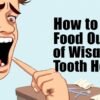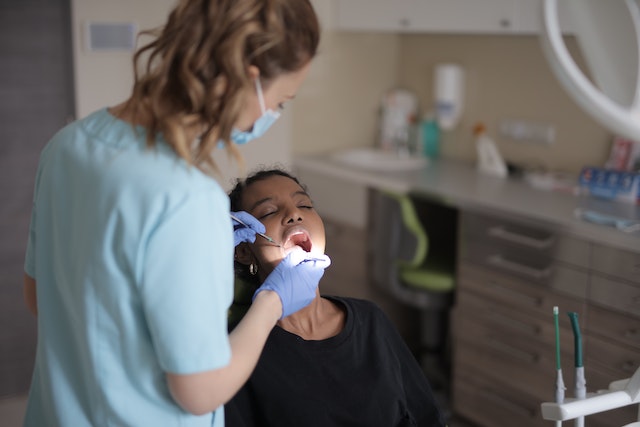Did you know that the condition of your teeth can tell a lot about your general health? Heart disease, diabetes, lung infections, and unfavorable pregnancy outcomes are some of the problems researchers have linked to poor Dental Habits. Poor Dental Habits are also linked to lower self-esteem and confidence.
Wisconsin and Illinois have consistently been two of the best states for dental healthcare. But recently, Ohio is quickly climbing up the ladder; reports from early 2023 place the state at number 10.
So if you’re in the Buckeye State, or any other for that matter, here are some tips to help you improve your Dental Habits:
1. Go for routine dental checkups:
Visiting the dentist at least twice a year for checkups is important for good Dental Habits. Regular dental examinations, cleaning, and scaling are essential for maintenance, detecting problems early, and preventing complications. In addition to checking the health of your teeth, gums, and mouth, your dentist will clean your teeth to get rid of tartar and plaque buildup.
You may need to visit an orthodontist if you have more serious issues, such as an overbite or underbite. Finding one in one of the top 10 states for dental healthcare in the US, such as Ohio, shouldn’t be too hard. The Buckeye State has at least one dentist for every 1,794 Ohioans, and you can easily look up the best orthodontist in Bellefontaine, OH, in local listings. Ensure the dentist offers state-of-the-art treatment and works under hygienic conditions.
2. Use fluoride toothpaste and brush twice daily:
Fluoride is a natural mineral that helps protect tooth enamel and keep cavities at bay. It also helps to strengthen our teeth as we age. Brushing your teeth twice daily helps keep them healthy.
Dentists recommend brushing your teeth after breakfast and before going to bed. Use a soft-bristled toothbrush with gentle circular or back-and-forth motions to brush your teeth while holding the brush at a 45-degree angle to your gum line.
Regular and proper brushing can help you get rid of plaque and bacteria that cause cavities and gum disease.
3. Floss your teeth every day:
Brushing alone isn’t alone to keep your teeth and mouth clean. Sometimes food particles get stuck in gaps that are difficult for a brush to clean, and that’s why dentists recommend flossing daily. This thin thread you move back and forth between the gaps in your teeth helps remove debris stuck in between, which prevents cavities and gum disease.
To effectively remove plaque, flossing must be done in the right way. Move the floss carefully down the gum line and between teeth, following the shape of your teeth. Then, make a C with the floss around the tooth, and move it back and forth and up and down to clean the tooth and the area below the gum line. If you floss too roughly or use too much force, you risk damaging your gums, so be gentle.
3. Use an antibacterial mouthwash or rinse:
An antibacterial mouthwash helps eliminate germs, clean the mouth, and alleviate gum swelling. It also helps to freshen your breath. It’s a good idea to use antibacterial mouthwashes like chlorhexidine, cetylpyridinium chloride, or one that contains fluoride. However, you shouldn’t use mouthwash without a dentist’s recommendation, nor shouldn’t be used as a substitute for regular brushing and flossing.
The correct way to use mouthwash is to measure and pour the recommended amount into the cap and then rinse your mouth with it for 30 seconds to 1 minute. Don’t swallow the mouthwash; instead, spit it out.
4. Avoid drinking alcohol:
Consuming alcohol on a regular basis might cause your mouth to dry up because it hinders saliva production. Saliva is important because it helps prevent tooth decay and gum disease by washing away bacteria and neutralizing acids in the mouth. A dry mouth makes oral health problems like foul breath, tooth decay, and gum disease more likely.
5. Avoid tobacco products for Better Dental Habits:
Tobacco usage, whether in the form of cigarettes or chewing, is detrimental to Dental Habits. Tobacco usage is associated with an increased risk of gum disease, oral cancer, and tooth discoloration due to the presence of toxic compounds in tobacco.
Smoking, in particular, poses major risks for advanced gum disease because it lowers the body’s resistance to infection and decreases blood flow to the gums, both of which contribute to gum disease.
6. Wear mouthguards when playing sports:
If you play sports, you should always wear some dental protection to keep your teeth, jaw, and mouth. A mouthguard can cushion and protect your teeth from damage in the event of a fall or blow to the face. The best mouthguards are custom-made by your dentist; they fit your mouth perfectly and protect it from harm.
7. Choose drinks that are easy on your teeth:
The beverages you consume have a major impact on your oral health. Choose sugar- and acid-free drinks like water, unsweetened tea, and milk to keep your teeth healthy. Avoid sodas, artificially-flavored fruit juices, energy drinks, and sports drinks because they can accelerate teeth decay and erosion.
Also, use a straw to reduce the time a sweet drink stays in contact with your teeth, and then wash your mouth with water afterward.
Conclusion:
Good Dental Habits can make you feel healthier down the road and add more charm to your smile and personality. Therefore, consider incorporating the tips mentioned above into your life. Be sure to visit a dentist twice a year to ensure your teeth remain clean, strong, and healthy for years to come.










